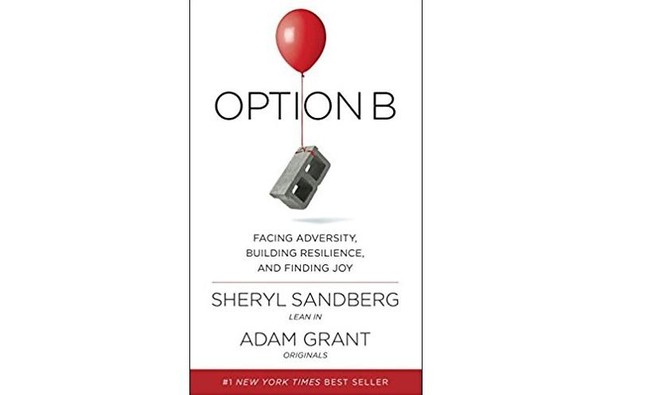There are times when you really need someone to talk to, someone who cares for you. However, when you need people the most, it is sometimes difficult to find a true friend.
In such moments, one discovers the true value of a book. Late American academic Charles William Eliot reminded us that “books are the quietest and most constant of friends, they are the most accessible and wisest of counsellors and the most patient of teachers.”
“Option B: Facing Adversity, Building Resilience and Finding Joy” is such a book. Compelling and inspiring, it helps us deal with the loss and tragedy we all experience at some point in our lives.
Adam Grant, a psychologist and author, co-wrote this book with Sheryl Kara Sandberg, activist, author and chief operating officer of Facebook.
When Sandberg’s husband died in 2015, she was devastated. She could not even grasp what was happening to her, but she knew that she had to go on. She had to wake up every morning and go to work. She had to get over the shock. But what about the pain? Can resilience help us deal with the deep sorrow that never seems to go away? Is it possible to find out in advance how resilient we are?
“No,” says Grant. Our level of resilience is not something pre-fixed. Resilience is the capacity of adapting well in the face of adversity, trauma or tragedy. The good news is that we can build resilience.
The authors share what they have learned about resilience and also tell the stories of remarkable people who have overcome extraordinary difficulties. They look at the steps people take to help themselves and to help others. They study the challenges of regaining confidence and study ways to speak about tragedy and comfort friends.
Psychologist Martin Seligman has spent many years studying how people overcome hardship and found out that three beliefs can postpone one’s recovery. First, the belief that the individual is at fault, second, that an event will affect all the areas of their life and third, that they shall always suffer from it.
Various studies have shown that children and adults recover more quickly when they realize that they are not responsible for particular hardships and that these hardships will neither impact their whole lives nor affect them forever.
Human beings have the tools to recover from loss and trauma, but we often forget to use them and we are so absorbed by our daily problems that we forget to talk to people who are suffering.
Sandberg realized her own shortcomings when she suffered due to people’s apparent indifference. She could not understand why her friends never asked her how she was coping without her husband, for example.
When author Mitch Carmody lost his nine-year-old son due to a brain tumor, he said: “Our child dies a second time when no one speaks their name.” Silence can be cruel. When we do not talk to people who suffer, we isolate them. Silence increases suffering. The truth is that your closest friends are not your best friends when you are experiencing great hardship. People who have faced adversity are far more compassionate toward others who are suffering, according to the book.
Sandberg explained how a simple greeting — such as “how are you?” — can be perceived as hurtful because it does not acknowledge that anything out of the ordinary has happened. However, when people ask more tailored questions — such as “how are you today?” — it shows that they are aware that a person may be struggling to get through each day.
“Not everyone feels comfortable talking openly about personal tragedy… Still, there’s powerful evidence that opening up about traumatic events can improve mental and physical health. Speaking to a friend or family member often helps people understand their own emotions and feel understood,” Sandberg wrote.
Author Emily McDowell acknowledges that the worst part of being diagnosed with cancer was not feeling sick after the chemotherapy or losing her hair, “it was… the loneliness and isolation I felt when many of my close friends and family members disappeared because they didn’t know what to say or said the absolute wrong thing without realizing it.”
The best thing you can say to someone who is suffering is “I understand your pain (and) I’m here with you,” but too often, and for all the wrong reasons, we do not say anything. We are afraid to say the wrong thing or we convince ourselves that we do not want to bother the person and we put off calling until we feel guilty.
The same people who postpone talking to someone in need are often the ones who hate asking for help. Sandberg says that she used to define her friendships by what she could offer, but she soon discovered that she was the one who needed help, “I did not just feel like a burden… I truly was a burden. I learned that friendship isn’t only what you can give, it is also what you can receive.”
The authors go on to tackle the importance of raising resilient children by telling the story of Timothy Chambers, an award-winning painter who is 70 percent deaf and legally blind. His paintings are so full of emotion and life that it has led many to wonder how the artist is able to paint with so much precision.
“Instead of taking in the whole scene, he scans his subject bit by bit, memorizing as many details as he can, then he fills in from memory what his eyes leave out,” Sandberg wrote.
Chambers suffers from Usher syndrome, a condition that affects both hearing and vision. At the age of five, he wore hearing aids and at the age of 30, a doctor told him to find another profession. He did not give up, however, and began teaching art classes online.
Chambers believes that he learned how to be resilient from his father. He remembers that when he complained that the children at his school were staring and wondering what was in his ear, his father told him that he should press on his hearing aid, throw a punch in the air and say in a loud voice, “yes, the Cubs are up two-one in the ninth!’’ He followed his father’s advice and his schoolmates were jealous as they thought he was listening to a game during a boring class.
Chambers learned how to respond to embarrassment with humor. He discovered that the way he reacted to his disability influenced how others reacted. In other words, he was able to control the way he was perceived. His father instinctively knew that you are not born resilient, you become resilient.
This book is like a multi-vitamin pill, it boosts your energy and morale and pushes you forward in life.


Book Review: Learning to cope with trauma and tragedy
Book Review: Learning to cope with trauma and tragedy

What We Are Reading Today: ‘How the Universe Got Its Spots’

- Nimbly explaining geometry, topology, chaos, and string theory, Levin shows how the pattern of hot and cold spots left over from the big bang may one day reveal the size of the cosmos
Author: JANNA LEVIN
Is the universe infinite or just really big? With this question, cosmologist Janna Levin announces the central theme of this book, which established her as one of the most direct, unorthodox, and creative voices in contemporary science.
As Levin sets out to determine how big “really big” may be, she offers a rare intimate look at the daily life of an innovative physicist, complete with jet lag and the tensions between personal relationships and the extreme demands of scientific exploration.
Nimbly explaining geometry, topology, chaos, and string theory, Levin shows how the pattern of hot and cold spots left over from the big bang may one day reveal the size of the cosmos.
© 2026 SAUDI RESEARCH & PUBLISHING COMPANY, All Rights Reserved And subject to Terms of Use Agreement.














